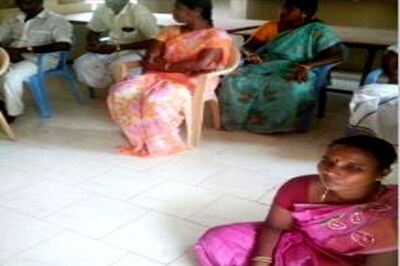
views
As India continues to battle the third wave of Covid, two health experts of Indian origin say that allowing the rapid spread of Omicron, a seemingly milder variant of Covid, is a better and safer bet to end the ongoing pandemic.
“Policies designed to slow the spread of Omicron may end up creating a super variant that is more infectious, more virulent, and more resistant to vaccines… To minimize that risk, policymakers must tolerate the rapid spread of milder variants. This will require difficult trade-offs, but it will save lives in the long run,” the Indian-origin experts, Vivek Ramaswamy, and Apoorva Ramaswamy argued in a WSJ OpEd.
The argument by Ramaswamy and Ramaswamy in the WSJ OpEd pertaining to why it is better to let Omicron run free was based on the scientific distinction between antigenic drift and antigenic shift.
“Antigenic drift describes the process by which single-point mutations (small genetic errors) randomly occur during the viral replication process. The result is minor alterations to antigens such as the spike protein. If a point mutation makes the virus less likely to survive, that variant gradually dies off. But if the mutation confers an incremental survival advantage—say, the ability to spread more quickly from one cell to another—then that strain becomes more likely to spread through the population. By contrast, “antigenic shift” refers to a discontinuous quantum leap from one antigen (or set of antigens) to a very different antigen (or set of antigens). New viral strains—such as those that jump from one species to another—tend to emerge from the antigenic shifts. The biological causes of the antigenic shift are often different from those of antigenic drift. For example, the physical swap of whole sections of the genome leads to more significant changes to viral genes than those caused by individual point mutations,” the opEd Read
Vivek Ramaswamy who is a founder and executive chairman of Roivant Sciences and Dr. Apoorva Ramaswamy who is an assistant professor of otolaryngology at the Ohio State University Medical Center also suggested in the OpEd to end mask mandates and social distancing in most settings because they slow the virus spread.
The opinion expressed by the duo came under the radar and was rubbished by several medical and healthcare professionals who termed it as them “intentionally trying to catch Omicron” and said it was a dangerous idea and was like playing with fire. This viewpoint was also not well received by some who had lost family members to Covid.
Meanwhile, a CNN review of this argument listed down several reasons explaining why it was not feasible. It said that the illness caused due to the virus was not a bad cold, as is widely believed.
“While many people were reported being asymptomatic or experiencing mild symptoms, it still posed a danger to those over 65, particularly those with low or weakened immunity or with underlying co-morbidities. It also argued against it citing the occurrence of long covid or the uncontrollable pressure on the healthcare system if the virus is allowed to spread unhindered.
While this argument received many negative responses, there were still few who embraced it amid growing exhaustion and frustration across the world over the unending mandates, protocols, and shutdowns.
Read all the Latest India News here




















Comments
0 comment